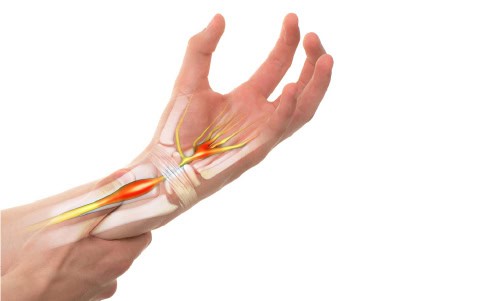Carpal tunnel surgery is a vital solution for those suffering from the pain, numbness, and weakness caused by carpal tunnel syndrome. This procedure can effectively address complications such as hand and wrist discomfort, tingling sensations, and reduced grip strength. Let’s delve into the details of carpal tunnel surgery, its benefits, and what patients can expect during the recovery process.
At the CK Birla Hospital, we are dedicated to ensuring that your carpal tunnel surgery is as safe, comfortable, and effective as possible. We're here to guide you every step of the way towards a successful recovery. If you're considering carpal tunnel surgery, reach out to us, or book a direct appointment with our orthopedician.

The pain in your carpal tunnel is primarily caused by excess pressure on the wrist and the median nerve, often accompanied by inflammation and swelling. This pressure can be exacerbated by various factors and underlying medical conditions, including:
Additionally, carpal tunnel syndrome can worsen with repeated overextension of the wrist, which can result from:
These factors collectively contribute to the development and aggravation of carpal tunnel syndrome.
Delaying or improperly performing carpal tunnel surgery can lead to complications, including:
1. Nerve damage: Prolonged compression of the median nerve can cause permanent nerve damage, resulting in weakness, numbness, or loss of sensation in the hand and fingers.
2. Reduced function: Untreated carpal tunnel syndrome may impair hand and wrist function, making it difficult to perform daily tasks.
3. Chronic pain: Persistent pain and discomfort in the wrist and hand can affect quality of life.
4. Decreased grip strength: Delayed surgery may lead to weakened grip strength, impacting one’s ability to hold objects securely.
5. Worsening symptoms: Without timely intervention, symptoms can worsen, making surgery more complex and recovery longer.
Carpal tunnel syndrome (CTS) progresses through three stages:
Stage 1 – Mild or Early CTS:
Stage 2 – Moderate or Intermediate CTS:
Stage 3 – Severe or Advanced CTS:
Early intervention is crucial, and treatment options vary, including wrist splints, medication, physical therapy, or surgery to relieve nerve pressure.
Carpal tunnel surgery options are:
By following these guidelines, you can significantly reduce the risk of developing CTS and promote better hand and wrist health.
Immediate Post-surgery Period:
Early Recovery Phase (First Few Weeks):
Gradual Rehabilitation (Over Several Months):
The cost of a carpal tunnel surgery varies as per the specific type advised by healthcare provider, such as:
The cost can also vary widely depending on several factors, including the location, the extent of the procedure, the surgeon’s experience, and the hospital’s pricing structure.
To get an explicit estimate for the cost of carpal tunnel surgery at the CK Birla Hospital, contact the hospital directly. Additionally, you can consult with our board-certified orthopaedic surgeon to discuss your specific needs and receive a personalised quote for the procedure.
Carpal tunnel syndrome (CTS) is a painful condition characterised by compression of the median nerve in the wrist, leading to numbness, tingling, and weakness in the hand.
Treatment for carpal tunnel syndrome includes wrist splints, physical therapy, pain relief medication, and in severe cases, surgery to release the compressed nerve. Consult a doctor for guidance.